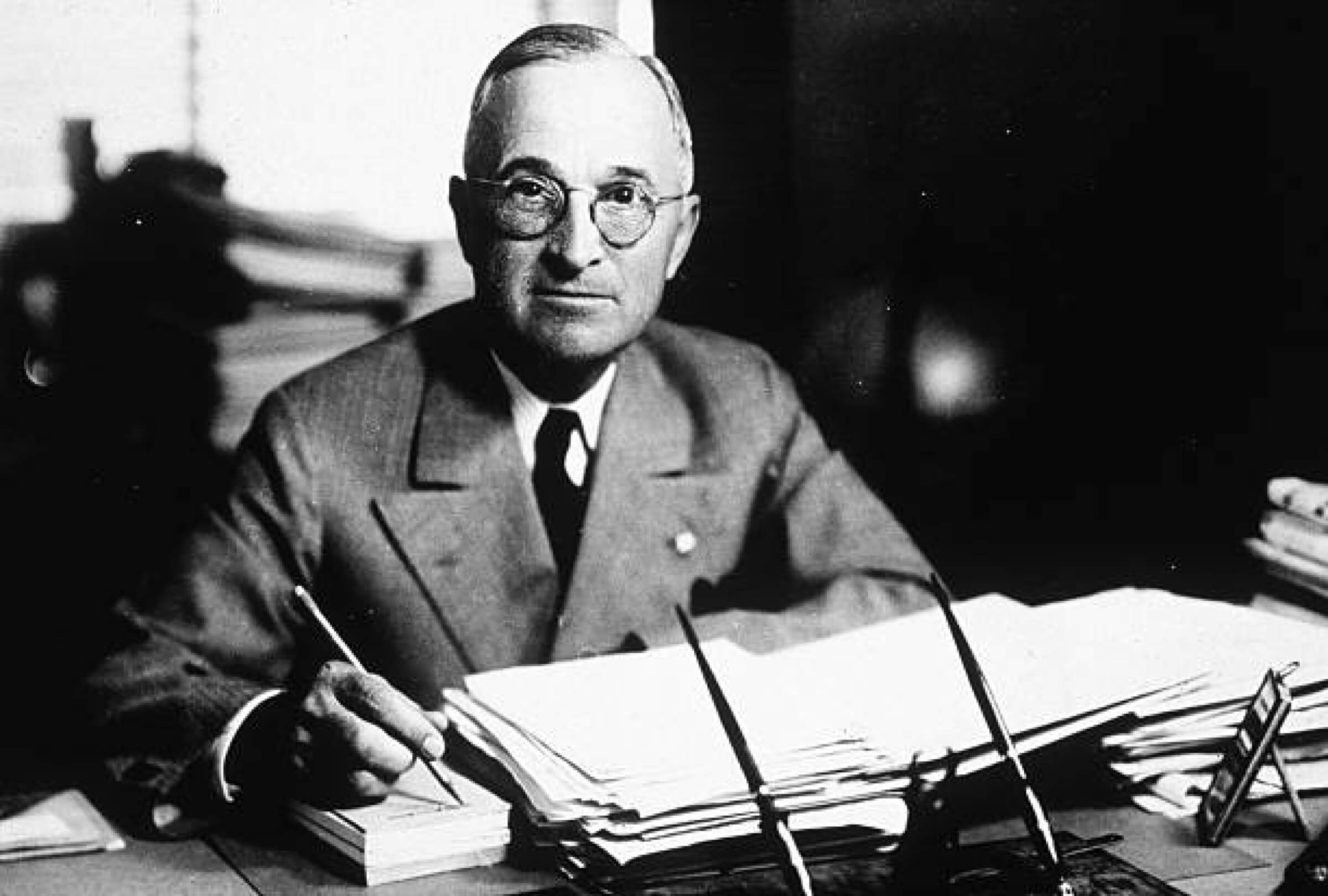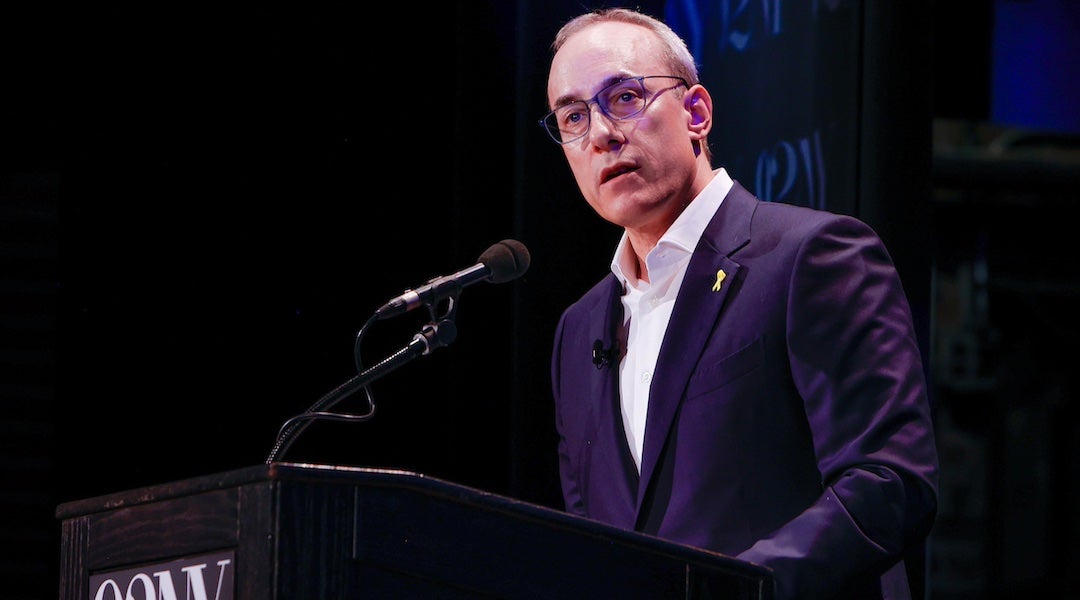Harry Truman, my flawed hero
The antisemitism revealed in his diaries is a stain on his reputation. Still, he remains a hero of Israel

Graphic by Angelie Zaslavsky
Okay, the Richard Nixon tapes were one thing. But Harry Truman? A heroic president to Jewish people, with institutes and forests in Israel named after him — and now we learn from the recently discovered Truman diaries of 1947 that he, too, was capable of the most sordid antisemitic attitudes.
“The Jews, I find are very, very selfish,” he wrote. “When they have power, physical, financial or political neither Hitler nor Stalin has anything on them for cruelty or mistreatment to the underdog.”
What gives?
First, Truman’s comments remind us how strong antisemitic attitudes were in the United States during the 1930s and 1940s. America, for reasons of history, of constitutionalism, of diversity, was never a place of pogroms or other violence against Jews the way Europe was.
But prejudice toward and stereotypes about Jews were pervasive. Seventeen years after Truman’s diary was written, the ADL found that 29% of Americans had antisemitic attitudes, including views of Jews as dishonest in business, as caring only about themselves, as not loyal to America, as having too much power.
Remember that during the late 1930s, “Radio Priest” Father Charles Coughlin was heard by millions of Americans every Sunday night articulating the vilest attacks toward Jews. And in 1940 and 1941, when America was deciding whether to join the allies in the war against Germany and Japan, Charles Lindbergh created the America First movement, which drew the support of many millions of Americans. A major tenet of America First was the belief that it was the Jews who sought to bring about American intervention for their own selfish interests and against the interests of the American people.
Keep in mind that educational programs to encourage tolerance were not a hallmark of America in those days, as they are today. Children who were taught prejudice at home or in church had fewer opportunities to unlearn their prejudices.
Of course, the most significant perspective in which to place Truman’s views is the historical impact of his presidency on the Jewish people. In that regard, whatever his cultural views of Jews, his contribution to Jewish history is unique and everlasting.
His decision to support the creation of the State of Israel despite the opposition of such powerful figures as George Marshall makes the diary comments pale in significance. Why Truman stood up for Israel at that critical moment has long been debated by historians. Seeking Jewish votes in 1948? His friendship with Eddie Jacobson? Biblical beliefs about Israel? Feelings for the Jewish people’s suffering? In the end, the decision speaks for itself.
Recognizing that the revelations in Truman’s diaries reflect the resiliency of the antisemitic virus, are there lessons for us in the 21st century?
For one, it reminds us to avoid complacency about antisemitism. Even in America, the place for a different kind of life for Jews, antisemitism has resilience in quarters where one might not expect it — Harry Truman, a highly respected progressive national leader; Billy Graham, the most prestigious religious figure in the country. Even as discrimination against Jews disappears, as attitudes improve, as Jewish security is strong, what people think and feel and say in the privacy of their homes or boardrooms is still uncertain. America the exception is also still America the product of a 2,000-year Western tradition of antisemitism.
Secondly, Truman’s diaries reveal once again the irrational character of antisemitism. It has often been noted that Jews are often accused of being contradictory things: Communists and capitalists, too powerful and too weak.
The 33rd American president writes of how “very, very selfish” Jews are and how brutal they are when in power. This, only two years after the Holocaust, when the Jews of Europe were destroyed; when more than one-third of world Jewry was wiped out; when the world, including the United States, largely stood by in the face of the Nazi inhumanity toward Jews, when Jews themselves failed to do enough to try to save their brethren in Europe.
Jews were at a low point in their history in 1947. That didn’t seem to stop Truman from attributing classic stereotypes about Jews.
The diaries, along with the Nixon tapes, also speak to the variability of anti-Jewishness. Those two presidents were capable of standing up for Israel at critical times, even while sharing many of society’s worst stereotypes abut Jews. Today, things are turned on their heads: Denials of antisemitism abound while one-sided criticism of Israel is rife and acceptable. Antisemitism is not only the largest hatred, it is the most elastic.
I am a Holocaust survivor, a displaced person, and in 1947 I was a stateless 7-year-old waiting to be received by some country other than Poland, Lithuania, Germany or Austria. Harry Truman was my hero, and in 1950, when as displaced persons my parents and I came to the United States, we believed it was the president himself who made it possible. It personally saddens me to learn that he too was so flawed.
Truman was a product of his time and of a civilization’s attitudes. The antisemitism revealed in his diaries is a stain on his reputation. Still, he remains a hero of Israel.
Abraham Foxman is national director of the Anti-Defamation League.
















